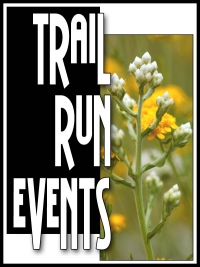
ULTRALADIES MAIN MENU
All content © Trail Run Events

by Nancy Shura-Dervin
What is so tough about Bulldog (besides 8,000 feet of climb and well, the 31-miles)??
The H E A T baby!
Rumor has it that it was 108 degrees at the 2011 Bulldog Trail Runs. Temperatures certainly might have reached this number, especially on the second loop climb of the infamous Bulldog Motorway, where there is little to no air flow and almost no shade.
What contributed to a very difficult race for many runners in 2011 was...
* that it did get very hot on the second loop on race day but more importantly...
* the weeks leading up race day were unseasonably cool, with morning fog cover that did not burn off until after noon and...
* most runners started their training runs early and were finished running by the time the sun came out. The lack of opportunity to train in the heat definitely took its toll on many of the runners!
Over the years, the Bulldog Runs have sent a few runners to the hospital because of heat-related illness. What follows is information on how to become heat trained for a hot, summer race like Bulldog.
HEAT TRAINING:
Acclimatization: (a-kl m -t -z sh n). n. The physiological adaptation of an animal or plant to changes in climate or environment, such as light, temperature, ...
Heat training (aka heat acclimitization) helps the body adapt to meet the demands of exercising in the heat and prepares the body for processing larger amounts of liquid that are required to cool the body in hot weather. Likewise, heat acclimitization helps you sweat sooner and in greater quantities with improved cooling effect which helps lower working heart rate and core temperature. Last but not least, heat acclimitization helps your sweat become more dilute and spares electrolytes, minimize the salt stain effect that we see so often; therefore heat trained athletes experience lower incidence of cramping during running.
Approximately two to three weeks of diligent heat training is desirable to prepare for hot summer ultras but any amount of heat training is certainly better than none! As you become more heat ready, you will notice that you feel a little chilled while others around you do not; a good sign.
When you first start heat training, your sweat will taste salty and will burn your eyes. As you become more heat acclimitized, your sweat will taste watery and you will produce sweat sooner and in greater quantity. Be sure to consume electrolyte replacement drinks and/or take electrolyte tabs as needed.
Ways to be better heat trained:
* Stop using the AC in your home and automobile. Just open your windows and get used to the heat!
* Run in the heat! Start your runs later in the morning or in the early afternoon so that you are training your body to run through the warmest part of the day. You might need to run a little slower but the benefits of heat training will win out on race day.
* When you can not run in the heat, wear layers of clothing during runs to inhibit cooling.
* Sit in a dry sauna to increase heat tolerance. You do not need to get badwater crazy here; just 10-15 minutes of the sauna exposure, a few times each week will help tremendously.
* Hot yoga or Bikram Yoga.
* It is recommended that you stop heat training approximately one-week before your scheduled event to allow your body complete recovery from the depleting effects of heat training.
Other helpful suggestions:
* Consume electrolyte drinks during heat training.
* Add electrolyte replacement tabs as needed to your heat routine.
* Avoid anti-inflammatories. NSAIDS and even Tylenol can actually negatively affect your kidney function which increase your chances of suffering from hyponatremia.
* Hydrate properly during heat sessions but be careful of over-hydration.
* Learn to Calculate Your Fluid Balance (see link below).
Helpful links:
* http://fellrnr.com/wiki/Heat_Acclimation_Training
* http://www.hotshotfitness.com/heat_and_desert_training.html
* http://heatrunning.com/sauna-training-tips/
CALCULATE YOUR FLUID BALANCE (Calculate Your Sweat Rate):
* http://www.trailrunevents.com/ors.asp (scroll to bottom)